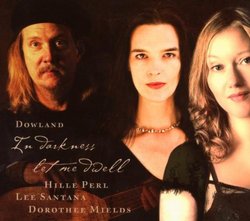| All Artists: Hille Perl Title: In Darkness Let Me Dwell Members Wishing: 1 Total Copies: 0 Label: Deutsche Harm Mundi Release Date: 9/23/2008 Album Type: Import Genre: Classical Styles: Chamber Music, Historical Periods, Classical (c.1770-1830) Number of Discs: 1 SwapaCD Credits: 1 UPC: 886972250229 |
Search - Hille Perl :: In Darkness Let Me Dwell
CD Details |
CD Reviews"Early music" doesn't get any better than this. Baroque and opera freak | Hong Kong | 03/29/2009 (5 out of 5 stars) "Dowland was born one year before Shakespeare, and he managed to live ten years longer. He wrote the most beautiful music of the Elizabethan age -- lute music, of course. Very, very sad; very, very melancholy; very, very true; very, very timeless. Thanks to the soul-emptying work of great musicians like Emma Kirkby, Paul O'Dette, Andreas Scholl, Sting, and above all the great viola da gamba master Hille Perl (and ethereal soprano Dorothee Mields) Dowland's music and poetry are enjoying a wonderful revival. I think that no more beautiful poetry/music has ever been written. It will pluck your heart-strings until your loins begin to cry, until your soul begins to cry, until all the previous generations that live in your body and in your spirit begin to cry -- and cry, and cry, and cry, melting finally into one vast pool of teares (yes, teares) that reflects the true story of human life from the beginning until the last syllable of recorded time. The way to bliss, you must know, is directly into and through the pain. Both Jesus and the Buddha taught that. As John says: "From silent night, true register of moanes, From saddest soul, consumde with deepest sinnes, From heart quite rent with sighes and heavy groanes, My wailing Muse her woeful worke beginnes, And to the world brings tunes of sad despaire, Sounding nought else but sorrow, griefe and care. Sorrow to see my sorrowes cause augmented, And yet less sorrowful were my sorrowes more: Griefe that my griefe with griefe is not prevented, For griefe it is must ease my grieved sore. Thus griefe and sorrow cares but how to grieve, For griefe and sorrow must my cares relieve."
And "If any eye therefore can spare a tear, To fill the well-spring that must wet my ckeekes, O let that eye to this sad feast draw neere, Refuse me not my humble soule beseeks: For all the teares mine eyes have ever wept, Were now too little had they all beene kept." "But down, down, down I fall. Down and arise -- I never shall. Come heavy sleepe, the image of true death. And close up these my weary weeping eyes." Or as Shakespeare put it, "To die, to sleep; To sleep, perchance to dream -- ay, there's the rub: For in that sleep of death what dreams may come, When we have shuffled off this mortal coil, Must give us pause -- there's the respect That makes calamity of so long life." Hille Perl and her fellow musicians have made a number of incredible albums (particularly the Telemann album), but perhaps this is the only one that takes the listener to that place where, as Perl herself says she discovered at 14, and as Confucius famously said, after hearing it one can die with perfect peace. This record is in a different dimension than any other CD I have ever heard, including Andreas Scholl's recent Dowland album and all of Jordi Savall's usually fine recordings. If you have this one CD, there is no need for more. You can die now, or tomorrow, or fifty years hence, it really doesn't matter, for you know that you have touched eternity, and that it will accept you into its bosom whenever it comes time for you to shuffle off this moral coil. Life cannot be defeated, just because there is light on the other side. And Dowland knew that light. He waits there now for you as well as me." |

